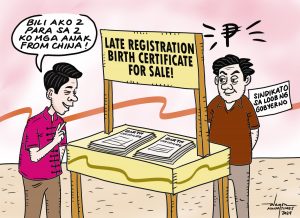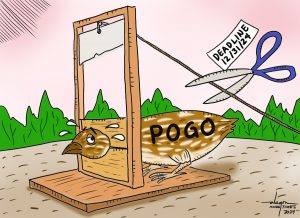This one is rather late, but as the common saying goes, “It’s better late than never.”
We mean our extending Congratulations to our former immediate boss at Davao Light and Power Co, Inc., Mr. Arturo Milan. We only knew late last week that from the holding firm Aboitiz Equity Venture (AEV) he has been seconded to Aboitiz Infra Capital. And later he was moved to Apo Agua Infrastructura, Inc. as member of the Board of Directors.
Like our former superior Mr. Manuel M. Orig who is still consultant of Apo Agua after almost two decades from his retirement at the power distribution firm, Mr. Milan is likely to duplicate the former’s achievement. In other words it is how valuable his person and services to the Aboitiz conglomerate are.
Anyhow, there are questions that we had already raised about a year ago when the excavation of one lane for the pipe laying of the Bulk Water Project was completed. And that was, “Whose responsibility is the repair of the seriously damaged portion on the other lane”? Is it of the Apo Agua’s where Mr. Milan is a leading executive; is it of DCWD’s; or is it solely of the government – local or national?
Why did we raise the question? It was because we believe that the repair of the damage on the undug side of the road will be a hot collateral issue that will surface when the Bulk Water Project will have been completed including the restoration of the excavated lane by the Apo Agua, the partner firm of the DCWD in the project.
And true enough. Now that the project is reported to be completed including the restoration of the excavated portions of the roads affected, some members of the City Council are putting Apo Agua – and the DCWD – to task for the claimed non-completion of the restoration and the low quality of the work done on the restored sections.
The said members of the local legislative body are also raising the issue on the responsibility of repairing the damage on the unexcavated lane where vehicles using the roads concerned have no other alternative.
Since there was never any restriction as to the size and weight of vehicles allowed to pass the routes where the diggings were made for the pipe laying, naturally the base of the concreted road gave way. Subsequently, the pavement cracked and eventually became vulnerable to water seepage. And if the absence of drainage is to be factored all the more that the road deterioration was inevitable.
We are however wondering if those councilors who raised the issue at the Council session have really seen the entire stretch of the roads used as route for the Bulk Water Supply delivery pipes. Maybe the water agency and its partner project implementer Apo Agua should invite the local lawmakers with representatives from the City Engineer’s Office (CEO), the Department of Public Works and Highways (for national roads) and some members of the media to be able to have a fair validation of the issues complained of.
We also believe that it is for the benefit of both the Apo Agua and the DCWD to retrieve documents and related materials, if there are, that will establish the conditions of each party involved in the grant and acquisition of authority to the APO Agua to use one lane of the roads as route of the large water pipes.
Maybe such documents as Memorandum of Agreement, if there are any entered into, will establish clearly whose responsibility is the repair of the destroyed lane other than the one excavated for the pipe-laying purpose.
We are certain that whatever will be the observation during the ride-through of the pipe route and knowing the conditions in the agreements and other documents relative to the use of one lane of government property for the project will settle all issues now surfaced by the councilors concerned.
**************************
By the way we would like to apologize to our readers for missing this page in yesterday’s issue. We had some unexpected visitors who dropped by the house at the time when we were supposed to be writing our column for yesterday’s issue. They lingered for almost two hours and their stay deprived us of sufficient time to write our piece.
But our visitors came from Bukidnon so we felt it unethical to deny them the opportunity to have some “kumustahans” among relatives who were unable to see each other for a long time.


